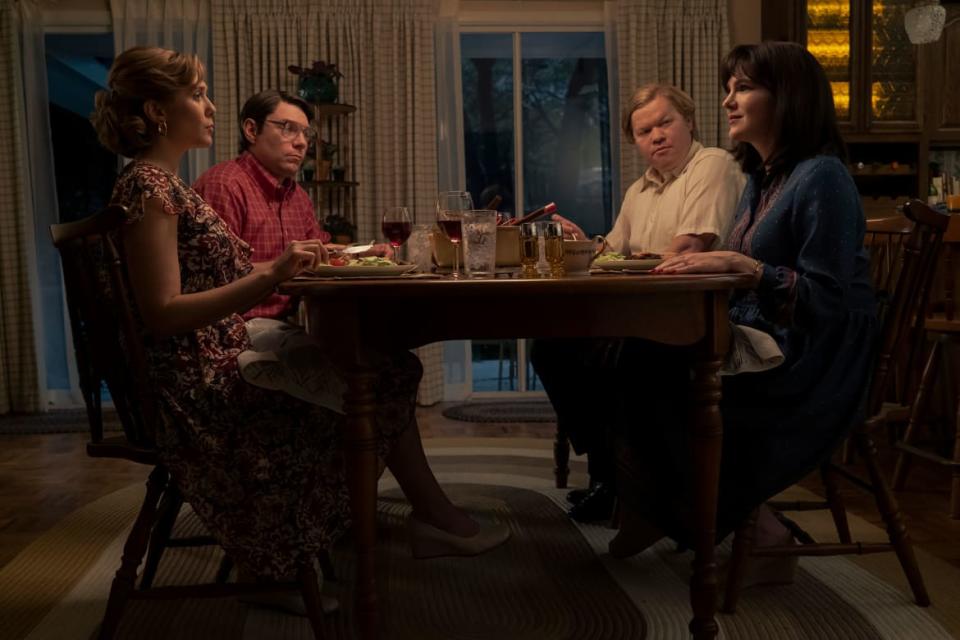‘Love & Death’: Elizabeth Olsen Falls in Love and Then Kills Her Friend With an Ax

- Oops!Something went wrong.Please try again later.
- Oops!Something went wrong.Please try again later.
- Oops!Something went wrong.Please try again later.
- Oops!Something went wrong.Please try again later.
Love & Death has a pedigree that’s as illustrious as any recent HBO effort. It comes from David E. Kelley, the prolific showrunner who’s most recently had success with Big Little Lies and The Undoing. It stars Elizabeth Olsen as a confused, disaffected and ultimately volatile suburban housewife—a role that more than faintly recalls her Emmy-nominated turn in WandaVision. It features a stellar cast that includes Jesse Plemons, Lily Rabe, Patrick Fugit, Elizabeth Marvel, Tom Pelphrey and Krysten Ritter. And it’s based on a notorious true-crime case that remains hotly debated today.
The sole thing missing from it, actually, is originality, given that audiences just received a dramatic retelling of this tale last year, courtesy of Jessica Biel’s five-part Hulu venture Candy.
It’ll be up to viewers to decide if twice is nice (or necessary) when it comes to Candy Montgomery, whose bloody saga is rehashed with aplomb, if few revelations, in Love & Death. Kelley’s seven-part HBO Max limited series premieres Apr. 27, and its prime contribution to the discourse surrounding its murder is to portray its subject in a relatively empathetic light.
Basing its take on a collection of Texas Monthly articles as well as Jim Atkinson and John Bloom’s book Evidence of Love: A True Story of Passion and Death in the Suburbs, it forwards a version of events that’s supposedly definitive; “This is a true story,” it proclaims at the beginning of each installment. But, in the end, the series is apt to still raise some questions, as well as eyebrows.
The main attraction of Love & Death is the lead performance of Olsen, who—temporarily released from her Marvel duties—shines charismatically as Candy, the Wylie, Texas, wife and mother who, on June 13, 1980, killed her friend Betty Gore (Rabe) by striking her 41 times with an ax. Candy claimed that this slaying was committed in self-defense after Betty attacked her in the wake of learning that her husband Allan (Plemons) had carried on an extramarital affair with Candy. That Candy chopped up Betty is not in doubt, nor is her prior tryst with Allan, although the true nature of the two women’s fateful encounter continues to be a matter of speculation—this despite the fact that, as true-crime aficionados (and Candy viewers) know, Candy was eventually found not guilty of homicide.

Krysten Ritter and Elizabeth Olsen in 'Love and Death'
In the early going of the show (which commences two years before Betty’s demise), Olsen embodies Candy as a vivacious, if bored woman. It’s her day-to-day tedium that inspires her to matter-of-factly propose to Plemons’ dull, schlubby Allan that they sleep together. Saddled with a wife suffering from postpartum depression and oppressive separation anxiety (Betty acts miserable every time he has to leave on a business trip) Allan hems and haws before reluctantly agreeing to a sexual arrangement that’s as neatly constructed as the place settings that Candy arranges in motel rooms for their lunches together.
Far from a “whirlwind romance,” theirs is a relationship meant to restore a bit of spark to their lives, if not to decimate their marriages, with Allan doggedly putting Betty’s well-being first and Candy exhibiting no signs of wanting to abandon her dry, but kind spouse Pat (Fugit), whose defining characteristic is that he’s a good choir singer.
Jessica Biel Is ‘Candy,’ a Permed Housewife Acquitted After Hitting Her Friend With an Axe 41 Times
Candy and Allan’s affair, the central crime, and the ensuing trial aren’t complicated enough to require seven episodes, and yet Love & Death never feels unduly padded. Kelley and his collaborators (including director Lesli Linka Glatter) use their considerable time to paint a comprehensive picture of their milieu, where the Methodist Church (run by Marvel’s pastor Jackie Ponder and, later, by Keir Gilchrist’s less popular replacement Ron Adams) is the focal point of everyone’s lives, binding them together in a spirit of pious altruism and camaraderie.

Elizabeth Olsen, Patrick Fugit, Lily Rabe, and Jesse Plemons in 'Love and Death'
At the same time, they capture the particular circumstances of Candy’s headspace, thanks in large part to Olsen, whose wide eyes and cheery smile convey the pragmatic and confident can-do attitude that compels Candy to become involved with Allan and powers her through her scandalous arrest, indictment, and prosecution.
In many respects, Love & Death feels conclusive: its many characters are all well-defined; its plot’s ins and outs are thoroughly dramatized; and its multiple viewpoints are adequately investigated. Still, while it’s eminently watchable from start to finish, Love & Death is missing something.
‘Dead Ringers’ Manages to Squander Two Rachel Weiszes
Part of it has to do with Candy herself, who as embodied by Olsen is almost too foxy, charming, and self-possessed for this tale; it’s hard to imagine someone this magnetic (and striking) being stuck in such dead-end circumstances, replete with a paramour who has to be initially goaded into sleeping with her. Olsen inhabits Candy from the inside out, authentically capturing her ennui, frustration, and pent-up anger. Yet she’s almost too movie star-charming for a figure like Candy, which undercuts the material.

Patrick Fugit and Elizabeth Olsen in 'Love and Death'
Even more problematic is that, by sticking closely to Candy’s POV, the series generates compassion for her (innocent) plight and, in doing so, avoids any complexity that might make revisiting this story worthwhile in the first place. Love & Death gives voice to a range of damning prosecutorial arguments. However, it only really imagines one scenario: Candy defending herself against Betty’s attack, during which she snaps and goes more or less berserk.
Consequently, there are no great bombshells to be found here, just a sympathetic portrait of a woman who wound up in a mess of her own (and Allan’s) making and had to convince the world that she didn’t intend to massacre her lover’s wife. The show is reasonably persuasive on that front, although as it moves through its litigation-centric second half—buoyed by Pelphrey’s enlivened turn as Candy’s lawyer, who fights regularly with the presiding judge—there’s a sense that the proceedings have assumed a narrow perspective on the mystery at hand.
Glossy and engaging, Love & Death does allow a touch of skepticism to emerge about Candy’s defense-team narrative—specifically with regards to the notion that Candy lost control and hacked Betty 41 times because of long-buried maternal trauma that was unearthed via hypnosis. Too often, though, Kelley’s latest has nothing especially fascinating to say about its protagonist, nor anything novel to add to the conversation about her infamous encounter. It leaves one wanting more, and not in the way it intends.
Liked this review? Sign up to get our weekly See Skip newsletter every Tuesday and find out what new shows and movies are worth watching, and which aren’t.
Get the Daily Beast's biggest scoops and scandals delivered right to your inbox. Sign up now.
Stay informed and gain unlimited access to the Daily Beast's unmatched reporting. Subscribe now.

